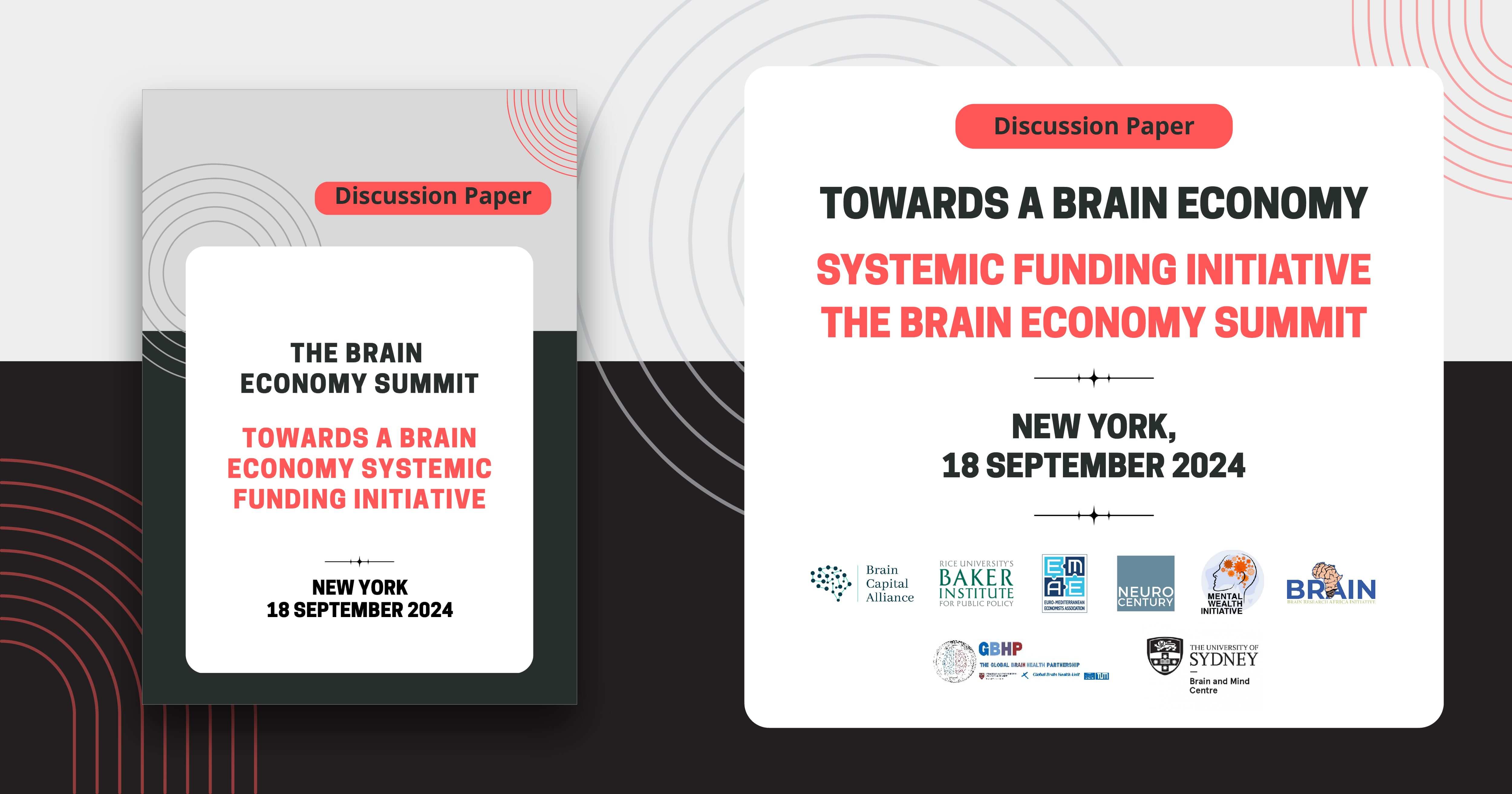This concept note draws on the discussions of a group of funders, investors and experts at an Euro-Mediterranean Economists Association (EMEA)-led high-level dialogue in January 2024, on the margins of the World Health Assembly in Geneva in May 2024 (see here), and at the European Investment Bank (EIB) office in London in June 2024 (see here). It is tabled for the UN Science Summit in September 2024, in the context of the growing commitment to the goals of the Brain Economy, as evidenced by the Yaoundé Declaration, endorsed by the President of Cameroon (note: Cameroon is leading the UNGA79 presidency), as well as Political Guidelines 2024-2029 of the President-elect of the European Commission, a new World Economic Forum paper produced with the McKinsey Health Institute, and forward-looking actions of a number of nations, including Finland, Sweden, Denmark and Switzerland.
The Brain Economy is an economy that places prime emphasis on people’s cognitive, emotional and social skills, proactive and anticipatory approach to health, as well as respect for planetary boundaries. Its concept stems from the centrality of the brain for human thriving in a period of rapid technological advancement, with complex issues around Artificial Intelligence (AI) and bioscience development, and in the face of a complex set of demographic, climate-related and environmental pressures. Solving brain health challenges will require major transitions across most major sectors. Each of these is complex and will require a systems approach. Incremental change will not be sufficient and there are few silver bullets. No single technology, policy, or actor alone can achieve these critical shifts. Rather, it will take a community of people working together across systems to employ innovative solutions and accelerate change.
The Brain Economy is an expression of the systemic nature of the processes behind wellbeing in the 21st century. It therefore extends to policies and practices that protect, promote and cultivate brain capital in an interconnected fashion in several disciplines, from health to education and training, as well as climate policy.
The Brain Economy aligns with the recommendations of the World Health Organization (WHO) Council on the Economics of Health for All, that governments can and should make the health and well-being of their populations a core goal of economic policy.
Systemic Approach to the Brain Economy
Good brain health, including mental health, is a precondition of thriving in the workplace. Optimal brain health can have a wide range of positive benefits, impacting productivity and emotional well-being. The brain functions more effectively in stress-free conditions, enabling better problem-solving, enhanced decision-making, and improved focus. Studies suggest that greater cognitive control and flexibility might be associated with the endorsement of more effective coping strategies1. Good mental health helps employee engagement and companies with highly engaged teams achieve higher productivity, better retention, fewer accidents, and 21% higher profitability, according to a Gallup report2.
On the other hand, current demographic shifts have the inevitable consequence of increasing the burden of brain disorders, whose prevalence is higher in an older population. Dementia affects memory, decision-making, and problem-solving abilities, which are crucial for many jobs. Even in the early stages, cognitive decline can lead to unsatisfactory work completion. Patients with dementia have an increased likelihood of leaving their job due to the impact of symptoms on their ability to work, as well as due to the workplace’s inability to adapt to the person’s needs3. Mental health issues can lead to both absenteeism (missed days at work) and presenteeism (being at work but not fully functioning). In fact, a change in mental health seems to have a much larger effect on absenteeism than a change in physical health. One recent study has put the mental health effect at three times the size4. According to the World Health Organization, depression and anxiety cost the global economy an estimated USD 1 trillion per year in lost productivity due to these factors5. The net present value of investment needed over the period of 2016-2030 to substantially scale up effective coverage for depression and anxiety disorders has been estimated at USD 147 billion6.
Good brain health enables drawing on the unique resources of brain skills, increasingly essential in the current stage of technological change7. The Dale Carnegie “Beyond Technology” study has highlighted that 75% of employees believe soft skills are crucial for remaining relevant in the AI age while an economic analysis commissioned by Korn Ferry and conducted by the Centre for Economics and Business Research finds that human capital represents to the global economy a potential value of USD 1,215 trillion, which is 2.33 times that of physical capital8.
McKinsey predicts that 30 percent of all current work hours will be automated by 20309, and LinkedIn researchers find that over the next five years 65% of workers will need to adapt their core skills10, emphasizing the need for skills that are transferable across various industries and roles. “A moment like this compels us to think differently about how we are training our workers,” LinkedIn and Jobs For the Future executives have written recently11, arguing that prioritization of technical skills “needs to change”. “Today the knowledge economy is giving way to a relationship economy,” they said. In this context, researchers at MIT’s Jameel World Education Lab developed the Human Skills Matrix12 to offer guidance. Elaborated four years’ ago, this framework now needs updating by focusing on brain skills, which place greater emphasis on cognitive, emotional and relational aspects, increasingly meaningful as generative AI improves its performance in the area of human-like cognitive skills.
A Systemic Approach Necessitates Systemic Investing
“The wicked problems of the 21st century call for a radically new approach to investing—one that pursues systems transformation, deploys capital with a broader intent and mindset, is anchored in different methodologies, structures, capabilities, and decision-making frameworks, and moves away from a project-by-project mentality to a strategic blending paradigm. Systemic investing answers this call. It is a holistic investment logic guiding the deployment of capital for the purpose of catalysing sustainability transitions in the places, value chains, and other real economy systems that matter most for human prosperity.”13
Although there is a growing international momentum to comprehensively strengthen brain health, as evidenced by the Intersectoral Global Action Plan for Epilepsy and Other Neurological Disorders adopted by the WHO in May 2022 and the Comprehensive Mental Health Action Plan 2013-203014, the effort has not been matched by corresponding funding commitments.
The most significant initiatives to date have focused on selected aspects of brain health. This has included the 2013 G8 Dementia Summit commitment to increase funding for dementia research, aiming to identify a cure or a disease-modifying therapy by 2025. In its aftermath, the Dementia Discovery Fund was launched with the support of the UK government and philanthropists like Bill Gates, to focus on early-stage drug discovery for dementia treatments.
What this approach underestimates is the interconnectedness of brain disorders and the commonality of actions needed in the field of prevention. There is a growing consensus that treating brain disorders holistically could be beneficial, given the overlapping symptoms, shared risk factors, and common biological mechanisms. As an example, anxiety and depression often occur together, while Attention Deficit Hyperactivity Disorder is frequently comorbid with substance abuse disorders. Finally, conditions such as Alzheimer’s, Parkinson’s, and Multiple Sclerosis involve neuroinflammatory processes, suggesting that treatments targeting inflammation could benefit multiple disorders.
In this context, holistic treatment approaches can be highly effective, including integrated care models, combining mental health services with primary care to improve outcomes for patients with comorbid conditions. They often require a change in the existing practice, assisted by interdisciplinary or transdisciplinary training. As a way of example, integrating behavioral health into primary care settings has been shown to reduce symptoms of both mental and physical health conditions. Lifestyle interventions that promote healthy living can help manage and even prevent multiple brain disorders. For instance, regular physical activity has been shown to reduce symptoms of depression and anxiety and improve cognitive function in individuals with neurodegenerative diseases.
Good brain health is related to strong brain skills, given that healthy brain function is essential for memory formation and recall, regular cognitive activities and a healthy lifestyle can enhance neuroplasticity, the brain’s ability to form new neural connections, which is crucial for learning and problem-solving. Good brain health supports sustained attention and focus, critical for tasks that require concentration and detailed work. Disorders like ADHD highlight how impaired brain function can disrupt these cognitive skills. Adequate sleep, nutrition, and regular mental exercises are known to improve attention span and overall cognitive function. In addition, brain health influences resilience, the ability to bounce back from adversity. Neurobiological resilience is partly determined by the brain’s capacity to process stress and recover from it, which is vital for maintaining emotional well-being.
In the field of education, one of the priorities needs to be ensuring that a higher proportion of children completes primary education. As The Lancet Commission has established15 less education is a modifiable risk factor for cognitive impairment and dementia. The Pratham project in India is an example of an innovative learning organization providing high-quality, low-cost and replicable interventions to address gaps in the education system in India16.
Optimal brain health is a crucial factor in driving the success of skill-intensive economic transformations, such as the bioeconomy, green economy, care economy, and digital transitions. Poor brain health presents a significant transition risk, as it impedes the development and utilization of brain capital: a critical economic asset encompassing both brain health and brain skills. The shift from a brain-negative economy, which depletes brain capital, to a brain-positive economy, which preserves and enhances it, is foundational for advancing these global transitions. Enhanced brain capital is indispensable for educational attainment, upskilling, and reskilling, making it a cornerstone of future economic prosperity. A new paper, forthcoming in Brain Communications outlines a comprehensive roadmap for achieving this brain economy transformation.
Inclusive approach to the Brain Economy requires as well as the integration of psychology, neurodevelopment, social science and public health experts, amongst others. The exposome-based and planetary health concepts need to be complemented by the One Health approach, with its interdisciplinary emphasis17.
The Case for a Systemic Funding Initiative
Given the interrelated nature of brain health and brain skills, there is a strong case for a new Systemic Funding Initiative that would aim to optimise interventions across the different domains of neuroscience, neurology, mental health and brain skill development.
Public, private and philanthropic funders would commit resources with the precondition of projects having to demonstrate their systemic nature. They would need to integrate various approaches to improve overall cognitive function, emotional well-being, and social capabilities.
Examples could include:
- New Generation Brain Health Services, incorporating lifelong brain health status tracking, and ensuring readiness to offer preventive / wellness services, introduce new biomarkers in primary care and to administer novel treatments, including the ones that slow cognitive decline. Such Services would need to include multidisciplinary healthcare teams and encompass complex infrastructure with infusion centers, imaging facilities, and laboratory testing
- Integrated Mental Health Services, combining mental health services with pediatrics and primary care to address both psychological and physical aspects of brain health. The Collaborative Care Model, involving a team of healthcare providers working together to treat mental health conditions such as depression and anxiety, has been shown to improve patient outcomes, including cognitive and emotional health.
- Nutritional Interventions focused on promoting diets rich in brain-healthy nutrients like omega-3 fatty acids, antioxidants, and vitamins. The MIND diet, a combination of the Mediterranean and DASH diets, emphasizes the consumption of green leafy vegetables, berries, nuts, and fish. This diet has been linked to a slower rate of cognitive decline and a lower risk of Alzheimer’s disease.
- Performing comprehensive, global examinations of the links between specific risk factors and brain disorders to identify the modifiable elements that are the strongest sources of health and economic loss.
- Establishing and developing the Neurotechnology Medicine Platform to foster advancements in the pre-competitive space. This platform will drive innovation and collaboration in neurotechnology, ultimately leading to breakthroughs in brain health.
A consortium of funders could agree to pursue this Initiative either as a Public-Private-Philantropic initiative, pooling resources and collaborating on management and execution, or by setting up a new entity, the Brain Economy Institute, and endowing it with resources to pursue the systemic investing approach18. Experience (and potential engagement) of multilateral banks, such as the European Investment Bank, would be particularly valuable, with lessons learned of its InnovFin Infectious Diseases Finance Facility and the Global Polio Eradication Programme.
Actions to be pursued in the first phase of the Initiative would include:
- Developing Taxonomy of Systemic Investing in the Brain Economy: this workstream would develop a comprehensive taxonomy of tools and mechanisms available for financing projects, initiatives, or organizations19. It will cover various funding sources across the capital stack, including equity, debt, grants, revenue-based financing, donations and philanthropy, hybrid instruments, corporate open innovation, specialized funding instruments, and impact bonds.
- Establishment of a Brain Economy Policy Lab focused on economic, social, and health policy, which is instrumental in creating environments that nurture brain health and brain skills. Such policies influence food systems, education and training, health and social system performance, workplace wellbeing, built environment, environmental health, early life exposures, and other social determinants of brain health and brain skills20. The Lab would undertake policy research to inform governments on coordinated economic, social, and health policies that will support transformation to a brain-positive economy.
Drawing on the Global Brain Capital Dashboard and the Systems Change Lab, the project would work with various actors to identify positive tipping points and barriers which could be removed along the way. The Lab would be designed to provide the private sector, policymakers, philanthropies, investors, advocates and global leaders with insights to drive policy, investment and action. Decision-makers could use the Brain Economy Policy Lab to understand the state of play across each system, determine which challenges require the greatest attention, and discover which actions can accelerate change. - Elaborating Evidence-based Case for Brain Economy Interventions: in order to demonstrate the value-added of the systemic investing approach, data would be collected and analyzed to build a compelling case for interventions that preserve brain capital. This involves demonstrating how optimizing prevention, treatments and care can save human and economic resources.
- Launching of Pilot Projects: a number of pilot projects would be pursued to showcase the value of anticipatory and preventive actions. The aim is to scale, adapt, or fast fail the pilots based on their ability to meet predetermined outcomes.
- See Robert L. Gabrys, Nassim Tabri, Hymie Anisman, Kimberly Matheson, “Cognitive Control and Flexibility in the Context of Stress and Depressive Symptoms: The Cognitive Control and Flexibility Questionnaire”, Frontiers of Psychology, November 2018,
https://www.frontiersin.org/journals/psychology/articles/10.3389/fpsyg.2018.02219/full - See: https://news.gallup.com/poll/241649/employee-engagement-rise.aspx
- Fabiola Silvaggi et al, “Keeping People with Dementia or Mild Cognitive Impairment in Employment: A Literature Review on Its Determinants”, International Journal of Environmental Research and Public Health, January 2020, https://www.researchgate.net/publication/338908228
- See: Mark Bryan, Andrew Bryce and Jennifer Roberts, “The effect of mental and physical health problems on sickness absence”. Eur J Health Econ., October 2021;
https://www.ncbi.nlm.nih.gov/pmc/articles/PMC8501363/ - See: https://www.who.int/teams/mental-health-and-substance-use/promotion-prevention/mental-health-in-the-workplace
- Dan Chisholm et al, Scaling-up treatment of depression and anxiety: a global return on investment analysis, The Lancet Psychiatry, Volume 3, Issue 5, 415 – 424,
https://www.thelancet.com/journals/lanpsy/article/PIIS2215-0366(16)30024-4/fulltext - See: The Future of Work. Jobs and AI platform: https://ai-research.csart-world.com/
- See: https://www.kornferry.com/insights/this-week-in-leadership/the-trillion-dollar-difference
- See: https://www.mckinsey.com/mgi/our-research/a-new-future-of-work-the-race-to-deploy-ai-and-raise-skills-in-europe-and-beyond
- See: https://www.forbes.com/sites/benjaminlaker/2023/10/03/linkedin-data-predicts-65-shift-in-job-skills-by-2030-due-to-ai/?sh=5095e015ef50
- See: https://www.nytimes.com/2024/02/14/opinion/ai-economy-jobs-colleges.html
- See: https://www.jwel.mit.edu/work/posts/human-skills-matrix
- See: https://transformation.capital/ideas/key-concepts
- See: https://www.who.int/publications/i/item/9789240031029
- See: “Dementia prevention, intervention, and care: 2024 of the standing Lancet Commission”,
https://www.thelancet.com/journals/lancet/article/PIIS0140-6736(24)01296-0/abstract - See: https://www.pratham.org/
- See: https://pubmed.ncbi.nlm.nih.gov/38723637/
- See: https://ssir.org/articles/entry/systemic_investing_for_social_change# and https://transformation.capital/ideas
- See: ibid
- See Agustin Ibanez et al, “Neurological links of the exposome and One Health”, Neuron 19 June 2024,
https://pubmed.ncbi.nlm.nih.gov/38723637/





